- Home
- J. D. Robb
Delusion in Death edahr-44 Page 6
Delusion in Death edahr-44 Read online
Page 6
“As you like, Lieutenant.”
4
Devon Lester had what Eve thought of as leprechaun red hair, worn in nappy dreads. It foamed and frizzed around a face the color of bleached burlap, and the face sat round as a beach ball on a neck thick as a tree trunk.
Eyes the color of raisins bulged out of it.
He rat-ta-tatted his fingers on the table, kept some quick, inner beat with his feet on the floor. Eve might have assumed he was a junkie jonesing for a fix, but he went still when his gaze latched on hers.
“You’re Roarke’s cop.”
“I’m NYPSD’s cop.”
“I meant, anyway, so anyway, I’m the manager. Roarke tagged me, told me there’d been trouble at the bar. People were dead. I’ve got a copy of the full crew I gave him.” He pulled it out of his pocket, set it on the table, carefully smoothed it flat. “Maybe you don’t need it since you’re his woman.”
“I’m my own woman.”
“I meant—I’m not doing so well.” He rubbed big, wide hands over his beach ball face. “I can’t get my head around it, or my guts. He—Roarke—didn’t get real specific. Just the trouble, the dead people, and how I was to send him the names and contacts on all the crew, and who was on tonight, and who wasn’t. I figured there’d been a fight or something. We don’t usually have much trouble, it’s not that kind of place. But that’s what I figured until I started hearing the media reports. So I tagged Bidot.”
Eve sat down. “Who’s Bidot?”
“Oh, I figured you’d know all the stuff. The guy who handles the bar business for Roarke.”
“I thought that was you.”
“I’m the manager. He’s the one I report to. You don’t just tag Roarke every time you need to clear something, you know? A man like him has a lot of balls in the air, right?”
“Sure.”
“You got a pecking order. I report to Bidot, Bidot reports to Roarke if Roarke needs to know. Like that.”
“Okay.”
“Okay.” Devon let out a whistle of breath, as if relieved to have that point cleared up. “He said, Bidot said, the cops were on it, and it was bad. Really bad. Like maybe—” He paused, swallowed audibly. “Maybe eighty people, maybe even more. Dead. In my place. My crew. He couldn’t tell me about my crew. I came in because I’ve got to know about my crew. I can’t get anybody who was on shift on the ’link. I need to know about my crew, and what—Jesus, lady, what the fuck?”
He was babbling, she thought, but had to give him credit for getting the information out. “Lieutenant. Lieutenant Dallas. You were off tonight. Is it your usual night off?”
“Yeah. I make the schedule, two weeks running. I like to be flexible, in case somebody’s got something going, wants to change a shift. We run a good, smooth place, and I’ve got a damn good crew. D.B. was on the stick tonight. He’s the assistant manager. I can’t get ahold of him. I went by there first, by the bar, but it’s sealed up, and there’s cops on the door. They wouldn’t tell me jack even when I said it was my place. I mean—”
“I get it. There was an incident in On the Rocks this evening that resulted in the deaths of eighty-three people.”
“Mother of God.” The bleached burlap face went lightly, sickly green. “Mary, Mother of God. Was there a bomb? Or a—”
“We’re investigating, Mr. Lester.”
“My crew. I got all the names right there. D. B. Graham, on the stick; Evie Hydelburg, that’s our cook; Marylee Birkston, head waitress—”
“I have the names. Ms. Birkston was in surgery the last I checked. Andrew Johnson—”
“Drew. He goes by Drew. He’s a busboy.”
“He’s in a coma. They’re both at Tribeca Health Center.”
Lester waited a beat, then two. “The others? What about the rest? I had nine people on that shift.”
“I’m sorry, Mr. Lester, those are the only members of your crew who survived.”
“Okay, that’s a mistake.” He lifted his fingers, heels of his hands firmly planted on the table as if he needed the anchor. And his voice was all reason. “That’s a mistake. I don’t mean to be disrespectful, Ms. Roarke, but—”
“Lieutenant Dallas.”
“Whatever.” Suddenly, like a lightning bolt, temper fired his eyes, and behind it crawled fear. “Seven of my people didn’t die. That doesn’t happen.”
“I’m sorry for your loss, Mr. Lester, and I understand this is hard to accept.”
“Well, I don’t accept it.” He surged to his feet. “Get that? It’s not acceptable. I want to speak to your superior.”
Eve rose as well. “I’ve just completed a briefing with my commander, and the task force assigned to this investigation. Which I’m heading. I’m telling you seven of your people are dead. Two are in the hospital, and you don’t hope any harder than I do that they survive.”
“This is bullshit.”
At the knock on the door, she pulled it open a bare inch. It didn’t surprise her to see Roarke.
“I can help here,” he said before she could speak.
She kept her mouth shut, though it took considerable effort, and stepped back. The instant Roarke entered the room, she saw he’d been right.
The heat in Lester’s eyes died instantly, and the fear rolled away into grief. “No. No.”
“Sit down, Devon. Sit down now.”
He obeyed, Eve decided, more because his legs just gave way.
“Just Marylee and Drew? All the others, all? They’re gone?”
“Yes. I need you to help the lieutenant, Devon. She’s going to do her best by them, by all of them. You can help her.”
“D.B. was getting married. He and his woman, they’ve been together three years, and they’re getting married in May. Evie, she just had her first grandkid. Katrina got a callback on an audition. I changed her shift so she’d get off at eight tonight so she could prep for it. She was supposed to go home early tonight.”
Roarke said nothing, just let him talk of each one of the dead, people he couldn’t claim to know, but were his as well. His eyes flicked up to Eve’s, held a moment—full of sorrow—when she set water in front of Lester.
“What happened to them? Please. God, please. You have to tell me what happened.”
“I’m not able to do that yet.” Eve sat again. “I need to ask you some questions.”
“All right. All right.”
“You said you had a good crew, but even so, sometimes there’s friction or upset. Have you had to discipline anyone? Break up any arguments?”
“Look.” He swiped at his eyes with his forearm, struggled out a couple of steadying breaths. “Okay, look, there’s always drama. Somebody has a fight with the wife, the boyfriend, whatever the hell. Or a customer gets bitchy, right? It’s just the way of the business. But my people got along. It’s a good place—good pay, good tips. Somebody needs to switch shifts, we switch. Somebody needs a shift covered, somebody covers.”
“You didn’t go in at all today?”
“No. Slept in, then me and my guy went to this gallery in SoHo. He likes the galleries. Had a late lunch, did some shopping.”
“Did anyone from the bar contact you today?”
“No. And that happens, sure, now and again. But not today. First time my ’link rang, it was Roarke. Quirk and I had a quiet day.”
“Have you had any trouble with anyone? You personally, or at the bar?”
“Nothing, really. I mean, our neighbor gave me some grief a couple weeks ago. We had a party and he said we were too loud. He’s an asshole. Even his wife can’t stand him.”
“What’s his name?”
“Oh man, he’s just an asshole neighbor.”
“I need to take care of the people who died today, Mr. Lester. So I talk to asshole neighbors.”
He gave her the name, the address, then stared down at his hands. “I’m sorry about before. I didn’t give you respect.”
“You lost friends today. Let’s both respect them, and tha
t’s enough.”
“What should I do?” He looked from Eve to Roarke. “I have to tell the rest of the crew. Should I go talk to them in person? I don’t think this is something I can tell the rest of my people over the ’link. And the families. I’ve got to tell … Jesus, Drew still lives at home with his parents. He’s just a kid.”
“We’re notifying the families,” Eve told him. “Leave that to us.”
“You should go home, Devon.” The quiet tone of Roarke’s voice brought Devon’s gaze back to him. “You’ll want to talk to the rest of your people tomorrow. Do you want me to arrange for Bidot to go with you?”
“I’ll take Quirk. They all know him, and they don’t know Bidot so well. If that’s okay.”
“Whatever you think best. If you need anything from me,” Roarke told him, “you can contact me directly. How did you get here?”
“What? Sorry?”
“How did you come to Central?”
“The subway.”
“I’ll have a car take you home. You’ll have a car,” Roarke insisted before Devon could protest. “At the main entrance. And you’ll have one tomorrow to take you where you and Quirk need to go.”
“Thanks.”
“They were my people, too.”
“Yes, sir. I guess they were.”
Eve let Devon out, said nothing as Roarke made arrangements for transportation. She just sat across from him until he was done.
“I don’t have to ask you your take this time,” she said.
“Then I’ll ask you yours.”
“You may not like it.”
“It wouldn’t be the first time.”
“He knows everyone there. We both know managing people means those people can piss you off—hit buttons, cause frustration.”
“So you solve that by poisoning them all with the goal of mass murder? That’s bollocks, Eve.”
“I’ve done a run on him. He’s married to Quirk McBane, an art teacher. Looks clean and tidy.”
“And that’s suspect? The clean and tidy among us?”
“He also has a brother. Christopher Lester. The brother’s a chemist, with a lot of letters after his name, who heads up a fancy, private lab. The incident happened on his day off. He knows the ins and outs of the place, and could have planted the substance at any time. Maybe it was on some sort of trigger, timer. We don’t know yet. Devon’s going to personally notify the rest of the staff, and get a lot of attention. He’s center there.”
“Christ Jesus.”
“Look, notification sucks. Unless you’re telling people when you want the reaction. He spent the day with the art teacher. Nice alibi. I bet we’ll be able to confirm with SoHo galleries, with the restaurant where they had lunch. All clean and tidy again.”
“You see him as a potential mass murderer—of people he worked with every day—because his brother’s a chemist, and he has an alibi?”
“Did you hear Mira? I agree with her profile. The killer knows that bar, works at it or patronizes it. He’ll try to insert himself in the investigation, which Devon Lester just did. His reaction hit all the right notes, sure, and no, it didn’t seem faked. But whoever did this would have intended to talk to the cops, to others, and would have prepared. I have to factor all of that in.”
“You’re right. I don’t like it.” He shoved up, circled the room. “But the fact so many people are dead outweighs that. What now?”
“I want to go by the lab, see if there’s anything new, give Dickhead a push if I have to.”
“A bribe, you’re meaning.”
“I better not have to bribe him for this. But if I do, it’s nice to have my deep pockets with me.” She stood. “I want to talk to Shelby Carstein because I’m going to be giving the hard eye to anybody who walked out of that bar before the infection. Then I need to think. I want to check in with Morris on the way.”
“I’ll drive.”
“Figured.” She pulled out her ’link to contact Morris as they headed down to the garage.
Dick Berenski, chief lab tech, hunched over his station with its series of comps like a gargoyle. His egg-shaped head rose over the shoulders of the lab coat he’d tossed over a screaming orange shirt and plum-colored skin-pants. She sincerely wished she’d lived her entire life without seeing Dickhead in skin-pants.
He sported a gold hoop in his ear—a new touch, and fancy, textured shoes that matched the pants.
He gave her a sour look. “I was at a club. Salsa.”
She made a new wish, that she would never in her lifetime observe him doing salsa. “Gee, sorry for the inconvenience. I bet the eighty-three dead people are a little put out, too.”
“I’m just saying. I’ve been to that bar, you know. They have a good happy hour.”
“Not today.”
“Guess not. Tox screen’s over the roof, every one of ’em we’ve processed. You got that already.”
“Give me more.”
“Sent a runner over to get samples from the survivors so we’d have a mixed group. Had to consider those who made it handled the substance different, or the substance reacts different if your brain’s still functioning, your heart’s still beating or whatnot.”
“Okay. And?”
“Same deal. It’s quick. In and out. Most drugs are going to give you a longer buzz—I mean, what’s the point in a twelve-minute ride?”
“Twelve minutes is confirmed?”
“That’s how long the effects last. Twelve minutes—give or take a minute depending on the size, weight, age of the vic, and how much alcohol or medication, illegals, food consumed. So it’s an eleven-to-fifteen-minute window, but average time is twelve.”
He scooted on his stool, played his long, skinny fingers over a screen. “What I did was mock up the substance. Got pretty damn close. I’m working on synthesizing a couple of the elements more exactly, but we’ve got the base here.”
“You can do that?”
He smirked. “Ain’t much I can’t do. I tried comp reconstruction, but the real deal’s going to give you more data. I put four micrograms together, infected a couple rats. Those fuckers went bat-shit. It wasn’t pretty either. It was kind of funny for a second or two, then … it wasn’t.”
“They killed each other.”
“They slaughtered each other. Tech I had assisting had to go puke. Mostly I’m going to rag their ass raw over that, but hell. It’s bad shit, Dallas.”
“Explain the bad shit to me.”
“You got your lysergic acid diethylamide—the LSD—as the base. That’s your hallucinogenic. Typically, you’re going to take it orally or inject it.”
“I know what it is, Dickie.”
“Yeah, well, see this isn’t typical. LSD’s pretty potent shit, but this is mega, like, condensed. He, like, distilled it. Kinda genius in a way. Like, ah, LSD moonshine, you could say. Then he sweetened it with one of the synthetics we’re still working on. With Zeus added to it, it’s going to be ugly—hallucinations, delusions, and the energy and violence. Kick in the mushrooms—the ibotenic acid, again condensed. Double hallucinogenics. Add a touch of synthetic adrenaline to pump up the Zeus, condensed testosterone—see everything condensed for more punch. Then a trace of arsenic.”
“Poison?”
“Harpo hadn’t started on the hair when we sent in the tox. She found arsenic in the hair tests. In small doses, and with these other factors, it can cause delusions. Mix it up, and you have bat-shit.
“You’re going to be deluded, pissed off, panicked, strong—for about twelve minutes. We averaged the effect time in humans from the rats. It would take maybe three or four minutes to start to feel the effects, go for twelve, then it would start fading.”
“That’s more,” Eve murmured.
“The good news is, if you live through it, it’s not going to cause brain damage, heart or kidney damage. Bad news, once it’s in you, you’ve got to ride it out, unless you get clear.”
“Clear?”
“It’s conden
sed, right, so if you get air—new air, fresh air. Get the hell outside, it’s going to dissipate faster. I’m working on how fast, how much.”
“How about an antidote, or a blocker?”
“Can’t say how you’d block it.”
“I thought you could do damn near anything.”
He scowled, then sulked, then considered. “Maybe.”
“I bet he’s got one.” There were bribes, and there were bribes, she thought. And a kick in the ego usually did the trick. “A fucker who thinks this up would think up a way to keep from stabbing himself in the throat if he got a whiff, or contact. He’d need a lab.”
“Wouldn’t hurt, but with a few beakers, tubes, a heat source? Hell, I could make this up in the freaking kitchen if I didn’t mind the risk of blowing myself to hell. The LSD’s a dicey choice. Finding the right combo, amounts—the recipe, say—that was the long, involved part. That was the genius. Putting it together, that’s a snap once you’ve got it. I blocked and encrypted the formula, my eyes only. You’re going to want to keep a tight lid on the recipe, or it won’t be safe to go to the goddamn corner deli.”
“He’s right,” Eve said when she got back in the car. “If the recipe for this insane stew leaks, somebody else—a lot of somebody elses—will cook it up.”
“There are viruses sealed up in government facilities on and off planet that could wipe out most of humanity.”
“That’s not making me feel any better.”
“The point is, the world is never safe. Nowhere is, realistically speaking. No one is, as you know better than most. But we live day-by-day. Eat, shop, sleep, make love, make babies, and go on with it. It’s what we have.”
“And sometimes what we have sucks. Let’s spread the joy, and go talk to Shelby Carstein.”
Shelby Carstein’s third-floor walk-up boasted a claustrophobic lobby and a stairwell that smelled, not unpleasantly, of roasted garlic. On the way up Eve heard a baby’s fretful cry, the rolling laugh of a comedy on screen, and the weeping notes she thought came from a violin.
She noted the security light blinking red on apartment 3-C, and the lack of palm plate or camera.
“Security’s not a top priority,” Eve commented.

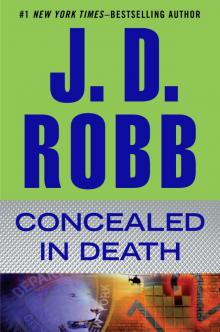 Concealed in Death
Concealed in Death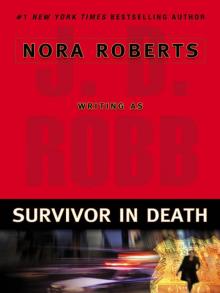 Survivor in Death
Survivor in Death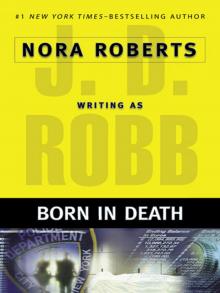 Born in Death
Born in Death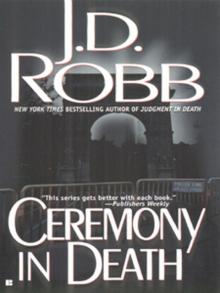 Ceremony in Death
Ceremony in Death Indulgence in Death
Indulgence in Death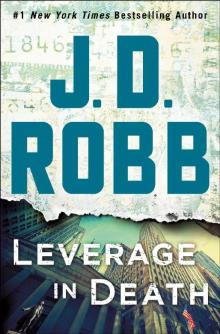 Leverage in Death
Leverage in Death Devoted in Death
Devoted in Death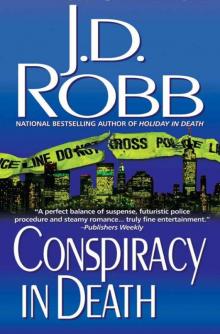 Conspiracy in Death
Conspiracy in Death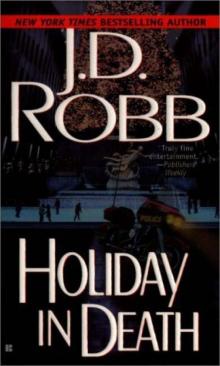 Holiday in Death
Holiday in Death The Unquiet
The Unquiet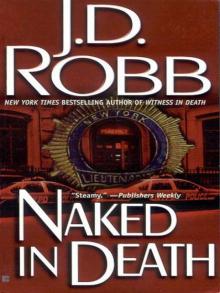 Naked in Death
Naked in Death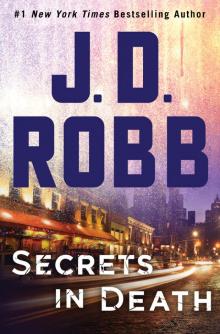 Secrets in Death
Secrets in Death Seduction in Death
Seduction in Death Strangers in Death
Strangers in Death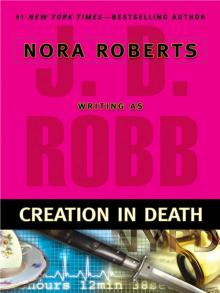 Creation in Death
Creation in Death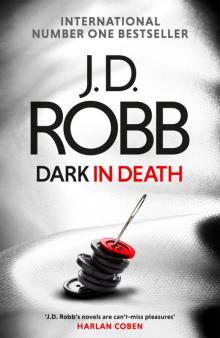 Dark in Death
Dark in Death Possession in Death
Possession in Death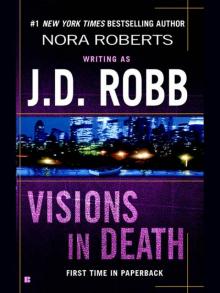 Visions in Death
Visions in Death Midnight in Death
Midnight in Death Innocent in Death
Innocent in Death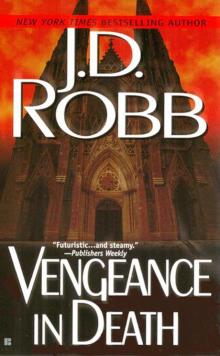 Vengeance in Death
Vengeance in Death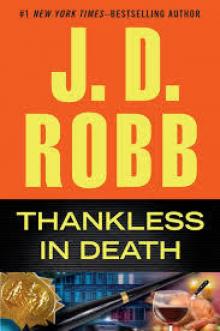 Thankless in Death
Thankless in Death Glory in Death
Glory in Death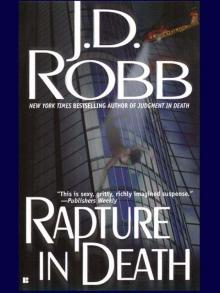 Rapture in Death
Rapture in Death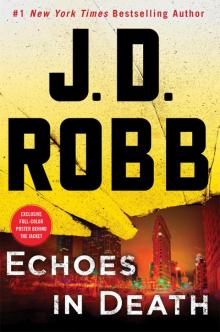 Echoes in Death
Echoes in Death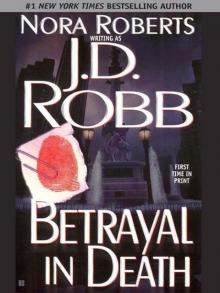 Betrayal in Death
Betrayal in Death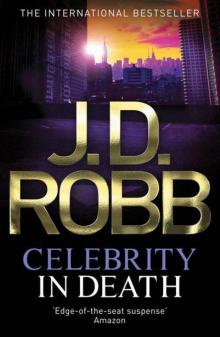 Celebrity in Death
Celebrity in Death Immortal in Death
Immortal in Death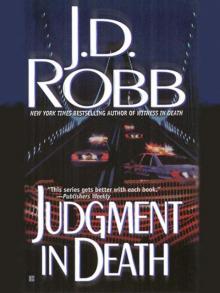 Judgment in Death
Judgment in Death Ritual in Death
Ritual in Death Portrait in Death
Portrait in Death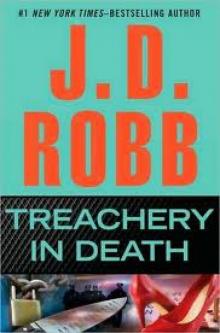 Treachery in Death
Treachery in Death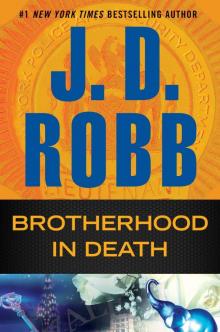 Brotherhood in Death
Brotherhood in Death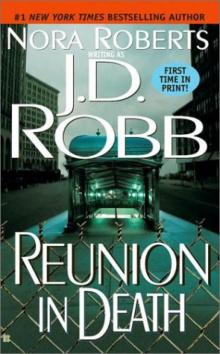 Reunion in Death
Reunion in Death Connections in Death: An Eve Dallas Novel
Connections in Death: An Eve Dallas Novel Imitation in Death
Imitation in Death New York to Dallas
New York to Dallas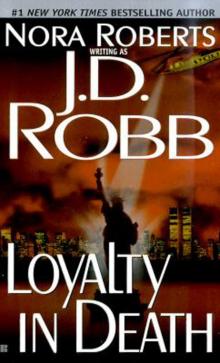 Loyalty in Death
Loyalty in Death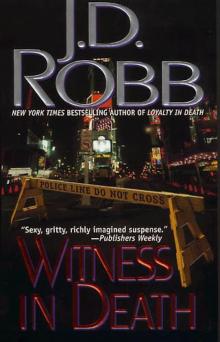 Witness in Death
Witness in Death Connections in Death
Connections in Death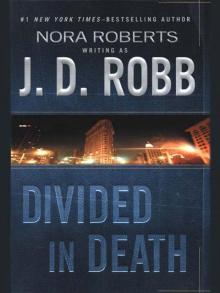 Divided in Death
Divided in Death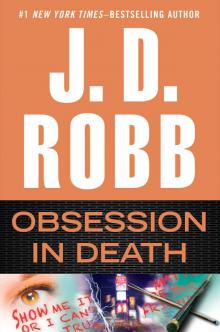 Obsession in Death
Obsession in Death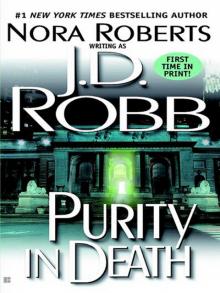 Purity in Death
Purity in Death Festive in Death
Festive in Death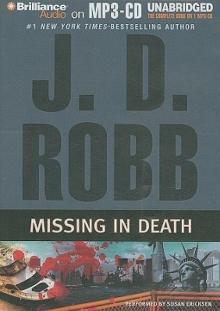 Missing in Death
Missing in Death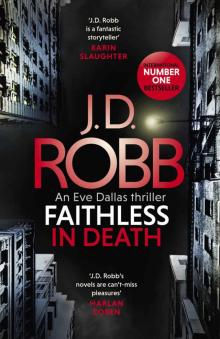 Faithless in Death: An Eve Dallas Thriller (Book 52)
Faithless in Death: An Eve Dallas Thriller (Book 52)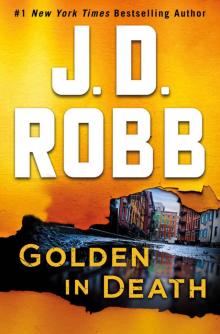 Golden in Death
Golden in Death The In Death Christmas Collection
The In Death Christmas Collection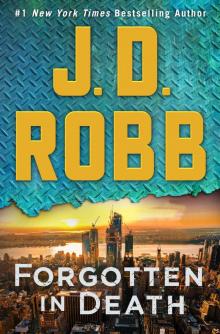 Forgotten in Death
Forgotten in Death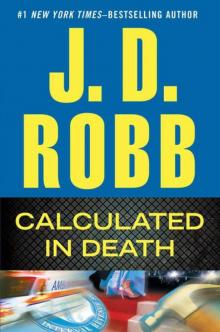 Calculated in Death
Calculated in Death Salvation in Death
Salvation in Death Interlude in Death
Interlude in Death Haunted in Death
Haunted in Death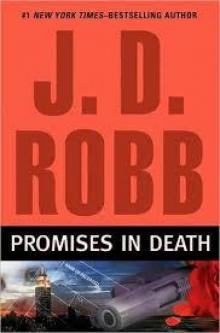 Promises in Death
Promises in Death In Death 07.5 - Midnight in Death
In Death 07.5 - Midnight in Death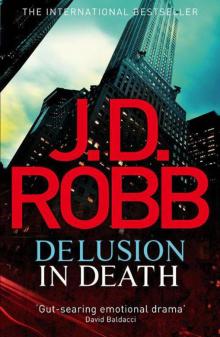 44 Delusion in Death
44 Delusion in Death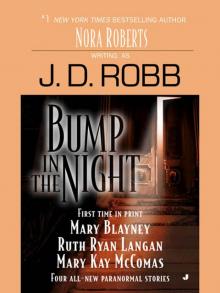 Bump in the Night
Bump in the Night The In Death Collection, Books 16-20
The In Death Collection, Books 16-20![[In Death 17] - Imitation in Death Read online](http://i1.bookreadfree.com/i/03/20/in_death_17_-_imitation_in_death_preview.jpg) [In Death 17] - Imitation in Death
[In Death 17] - Imitation in Death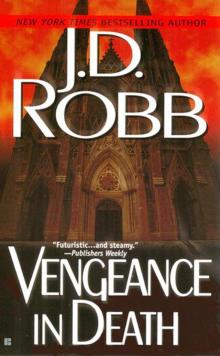 In Death 06 - Vengeance in Death
In Death 06 - Vengeance in Death Dead Of Night
Dead Of Night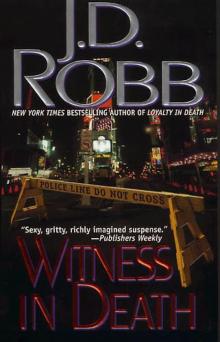 In Death 10 - Witness in Death
In Death 10 - Witness in Death![[In Death 16] - Portrait in Death Read online](http://i1.bookreadfree.com/i1/03/27/in_death_16_-_portrait_in_death_preview.jpg) [In Death 16] - Portrait in Death
[In Death 16] - Portrait in Death Possession in Death edahr-39
Possession in Death edahr-39 Remember When edahr-20
Remember When edahr-20 Big Jack
Big Jack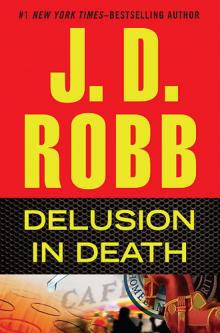 Delusion in Death edahr-44
Delusion in Death edahr-44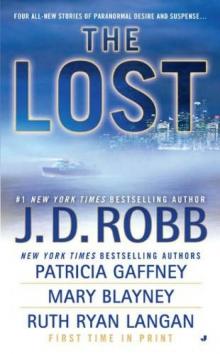 Missing in Death edahr-36
Missing in Death edahr-36 Origin in Death edahr-24
Origin in Death edahr-24![[In Death 18] - Divided in Death Read online](http://i1.bookreadfree.com/i1/04/03/in_death_18_-_divided_in_death_preview.jpg) [In Death 18] - Divided in Death
[In Death 18] - Divided in Death The Lost
The Lost![[In Death 05] - Ceremony in Death Read online](http://i1.bookreadfree.com/i1/04/01/in_death_05_-_ceremony_in_death_preview.jpg) [In Death 05] - Ceremony in Death
[In Death 05] - Ceremony in Death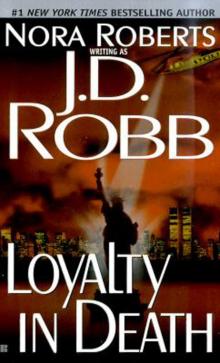 In Death 09 - Loyalty in Death
In Death 09 - Loyalty in Death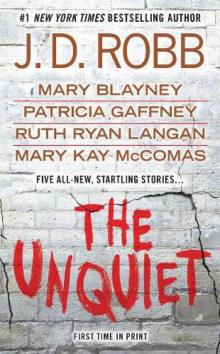 Chaos in Death edahr-42
Chaos in Death edahr-42 In Death 12.5 - Interlude in Death
In Death 12.5 - Interlude in Death![In Death [47] Leverage in Death Read online](http://i1.bookreadfree.com/i1/04/01/in_death_47_leverage_in_death_preview.jpg) In Death [47] Leverage in Death
In Death [47] Leverage in Death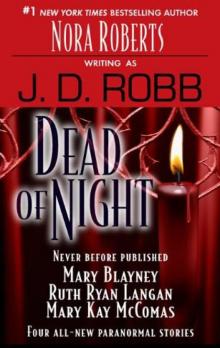 In Death - 24.50 - Dead of Night
In Death - 24.50 - Dead of Night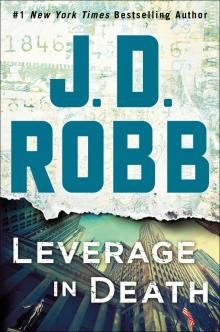 Leverage in Death--An Eve Dallas Novel
Leverage in Death--An Eve Dallas Novel![[In Death 24] - Innocent in Death Read online](http://i1.bookreadfree.com/i1/04/05/in_death_24_-_innocent_in_death_preview.jpg) [In Death 24] - Innocent in Death
[In Death 24] - Innocent in Death![[In Death 15] - Purity in Death Read online](http://i1.bookreadfree.com/i1/04/05/in_death_15_-_purity_in_death_preview.jpg) [In Death 15] - Purity in Death
[In Death 15] - Purity in Death The In Death Collection, Books 26-29
The In Death Collection, Books 26-29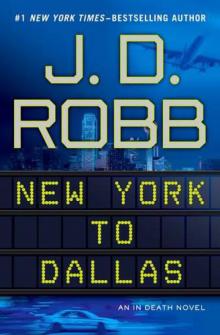 New York to Dallas edahr-41
New York to Dallas edahr-41 The Other Side
The Other Side The In Death Collection 06-10
The In Death Collection 06-10![[In Death 08] - Conspiracy in Death Read online](http://i1.bookreadfree.com/i2/04/05/in_death_08_-_conspiracy_in_death_preview.jpg) [In Death 08] - Conspiracy in Death
[In Death 08] - Conspiracy in Death The In Death Collection, Books 21-25
The In Death Collection, Books 21-25 Memory in Death edahr-25
Memory in Death edahr-25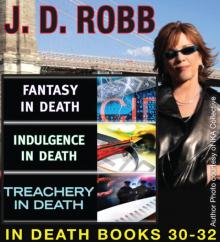 The In Death Collection, Books 30-32
The In Death Collection, Books 30-32 Down the Rabbit Hole
Down the Rabbit Hole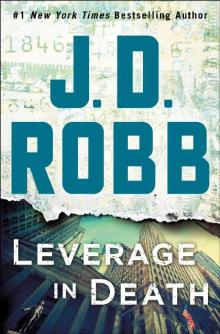 Leverage in Death: An Eve Dallas Novel (In Death, Book 47)
Leverage in Death: An Eve Dallas Novel (In Death, Book 47) The In Death Collection, Books 6-10
The In Death Collection, Books 6-10 The In Death Collection, Books 11-15
The In Death Collection, Books 11-15 Celebrity in Death edahr-43
Celebrity in Death edahr-43 Treachery in Death edahr-40
Treachery in Death edahr-40![[In Death 12] - Betrayal in Death Read online](http://i1.bookreadfree.com/i2/04/13/in_death_12_-_betrayal_in_death_preview.jpg) [In Death 12] - Betrayal in Death
[In Death 12] - Betrayal in Death The In Death Collection, Books 1-5
The In Death Collection, Books 1-5